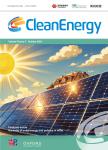Techno-economic analysis of a hybrid renewable energy system integrated with productive activities in an underdeveloped rural region of eastern Indonesia
作者机构:Sustainable Energy Systems and Policy Research ClusterUniversitas IndonesiaDepok16424Indonesia Chemical Engineering DepartmentFaculty of EngineeringUniversitas IndonesiaDepok16424Indonesia Master Program in Energy Systems EngineeringFaculty of EngineeringUniversitas IndonesiaDepok16424Indonesia
出 版 物:《Clean Energy》 (清洁能源(英文))
年 卷 期:2023年第7卷第6期
页 面:1247-1267页
核心收录:
学科分类:080702[工学-热能工程] 08[工学] 0807[工学-动力工程及工程热物理]
基 金:The authors are grateful to the Faculty of Engineering Universitas Indonesia for supporting this work financially under the Seed Grant Professor FTUI Contract Number:NKB-1966/UN2.F4.D/PPM.00.00/2022
主 题:underdeveloped region hybrid renewable energy system photovoltaics wind turbine Indonesia
摘 要:The Southwest Maluku region in eastern Indonesia is considered a frontier,outermost and underdeveloped *** inhabitants live on isolated islands,including the residents of Mahaleta Village,where only 9.4%of the community have limited access to *** study aimed to design an economically feasible hybrid renewable energy(RE)system based on solar and wind energy to integrate with the productive activities of the *** study developed conceptual schemes to meet the demand for electricity from the resi-dential,community,commercial and productive sectors of the *** analysis was performed using a techno-economic *** hybrid system was designed using the HOMER Pro optimization function,and cold-storage and dryer systems were designed to support related productive *** optimized design of the hybrid RE system comprised 271.62 kW of solar photovoltaics,80 kW of wind turbines and a 1-MWh lead-acid *** found that the hybrid RE system would only be economically feasible with a full-grant incentive and an electricity tariff of$0.0808/***,the productive activity schemes were all economically feasible,with a cold-storage cost of$0.035/kg and a drying cost of$0.082/*** the hybrid RE system with productive activities can improve the economic feasibility of the energy system and create more jobs as well as increase income for the local community.



